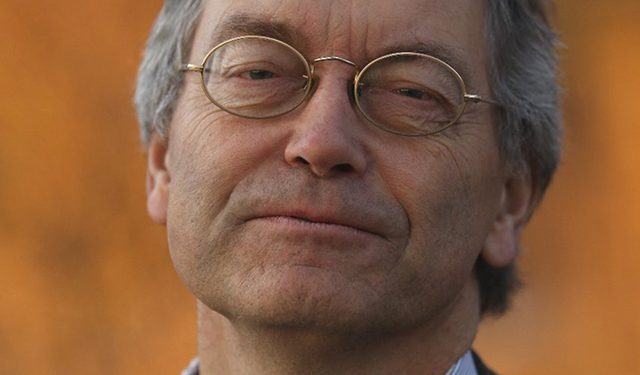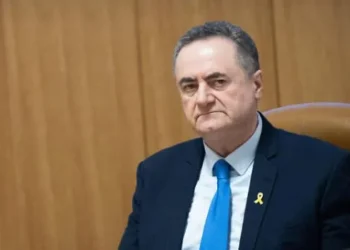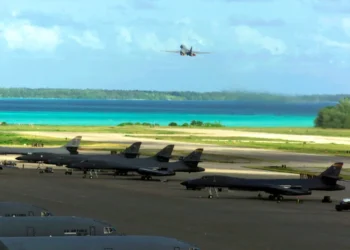Radio Free Europe’s Georgian Service met with Prof. Iver B. Neumann, the “bad boy of Scandinavian Realpolitik” and one of the definitive contemporary scholars of Russia, to discuss that very country and its relationship with Europe.
In Neumann’s seminal 1990s work, “Russia and the Idea of Europe,” he correctly predicted that Russia’s liberal tenure wouldn’t last long and would be replaced by a nationalistic attitude. In the second, revised edition, he explained how this prediction came true and added another one for good measure: That Russia’s position would soon change in a westernizing direction. He also argued there are only two things that bring change in Russia historically – wars and change of leadership. We ask him, is the war in Ukraine the beginning of that?
“It turned out that things had to get worse before they got better again,” he answers. “In the international system, there is a limit to how difficult and how different a large state can be if it still wants to compete with the other states in the system. It somehow has to keep up with what’s going on elsewhere. And China is a shining example of this logic. From 1979 on, they saw that the communist economic system simply didn’t deliver the goods, they couldn’t compete with other states, the US or the western states, India, etc., if they didn’t overhaul the economy. Russia’s problem is that they simply refused to understand that.
Since Putin’s tenure began 22 years ago, very little, if anything, has really happened to the economy. And I find it stunning that a trained Marxist like Putin simply doesn’t grasp that material factors are of the essence. He’s talking about what in Russian tradition is called volunteerism – that the will is so strong that we can trump a weak economy. “The West have the economy but we have the will.” It doesn’t work. So I think this is the beginning of the end for the Putin regime. The question then is do we get a regime that will continue what Putin did or will they go straight to a new Westernizer? I have a feeling that we may [yet] go for something that is not westernizing before we get to the westernizing, because I see very little westernized organized opposition in Russia, which is, of course, rather bad for the country.
Take Navalny – he is in prison, and though his movement is super interesting, it’s not a clear-cut westernizing movement – it started as a Russian nationalist movement. I think of Navalny more a Peter the Great in the making, one that has to westernize in order to bring Russia up to speed, as it were. Putin and his regime have done a thorough job of rooting out what there was of organized liberal thinking and work in Russia. Bad for the country, good for the Putin regime.
You write that Russians are obsessed with the idea of being the great power and will only support a leader who can fulfill their ambitions. How does Navalny sit in that equation?
Navalny is definitely leading from the front. He is definitely standing up to power and he is speaking his mind, and doing so with no filter whatsoever. The man is super Russian in that respect. I’m impressed by Navalny, though not with his lack of finesse. But he has the conviction of his opinions, and he is a good organizer. He stands in a very Russian tradition [of leaders], I think.
How would Navalny set about making Russia a great power? And what would that mean for the rest of the world? Especially for the so-called “near abroad”?
He has consistently talked about corruption being the problem of Russia, and the present regime being a regime of thieves, and he would go about doing that, which is not easy, because in a corrupt system, any new power will have to consolidate its power by being corrupt itself. Getting out of that vicious circle is very hard.
The most worrying thing about this war is that except for Ukraine being battered the way it is, it lowers the threshold for the use of nuclear weapons
How Navalny would act in relation to the near abroad, well, this whole idea that Russia has special leeway, special rights, because it’s a great power, breaks with the entire idea of the modern state system, which is reciprocity between sovereign states. I have seen little from what I’ve heard and read from Navalny telling us about that. But the Russian impulse is, of course, an imperial impulse. So the hard thing would be to break with that.
Russians have this ideafix that their country is to serve as an example to the rest of humankind. If it is indeed an example, what is there to learn from the Russians?
I don’t think it’s hard to think of Russia as something special. Every country has something special, and Russia is, as an American would say, extra special in that it is historically a bridge between the Asian and European traditions, there is no doubt about that, with the experience of the Mongols, with the experience before and after that of Turkic groups. Russia has a specific sort of, should we say cosmopolitan side to it. And I find it interesting that Russians can be super racist, super clear in denigrating other people, but at the same time, they were the ones to first build a mosque where people could serve their God, before European countries did it. And they were the ones who, when they conquered people, would take the local aristocracy and make it part of the Russian aristocracy. So they do have a tradition of integration, which sits rather uneasily with the general racist tenor of the debate, but it is there.
I have a colleague called Vyacheslav Morozov, who wrote a book about Russia and Europe, and his point was that the Putin regime had nothing to prop itself up ideologically except a hatred of Europe and the denigration of “European decadence” and European sexual morals and women’s rights, that were an “onslaught to the family”, etc. The whole thing is negative ideology, and there is nothing to learn in this sense. The Putin regime has nothing to teach us, except, of course, how not to do things. For example, how not to run an economy.
Russia strives to be portrayed as the Third Rome. How important a foreign and domestic policy tool is religion for the Kremlin and Russia?
Historically, religion is inestimable; it’s super important for a country. And with nothing new to prop the regime up, Putin will have to go back to Soviet and Tsarist times in order to do so. He’s going back to [Konstantin] Pobedonostsev’s idea which propped up 19th century Tsarist Russia that the rigid legitimacy of the Russian state rests on a tripod of autocracy, orthodoxy, and, however “narodnost” would translate into English – Peopleness? A celebration of the simple people as it were. I see a return to this, and it bothers me because there is so little creativity in it from Putin.
Then Putin adds another ingredient to this cocktail, and that is “nuclear,” and we get what you call “nuclear orthodoxy”. How much of a threat is that for the rest of the world?
The way Russia has, over the last couple of years, played lightly with nuclear weapons, the way their TV commentators talk about obliterating Great Britain on primetime TV, the way Putin has been hinting that the world will see consequences that it has never seen before, the way he poses with his briefcase, and talks about nuclear war… This whole thing, in and of itself, increases the chances of there being a nuclear war, because when you talk about it, you make it more natural, more normal; you increase the chances, you are lowering the barriers. And that’s a very bad thing, not only for Europe, but for the world, actually. Because one thing that Europeans simply don’t want to notice about this war is that it’s a regional war. It’s not a global war. It’s not a repeat of the Cold War, which was a world-enveloping thing. We named a period in world history after that war. We call it the Cold War period. If you see this from India, China – It’s a war of consequence. It’s important, but it’s not world defining in the way the Cold War was. It’s a regional war. And the most worrying thing about this war is that except for Ukraine being battered the way it is, it lowers the threshold for the use of nuclear weapons.
China, India, Brazil or Latin America might not see this as a world-defining war, but the proverbial West certainly does. What’s at stake for the West in this regional war?
It’s a war in Europe, so for Europe and the West it’s a question of whether you can uphold the idea that conflicts should be settled peacefully and whether you can uphold the idea that Pacta Sunt Servanda, as the old Roman said – that deals you’ve been making should be kept. These are the basic tenets not only for the liberal international order, but of Western society. You can’t have contracts, for example, if you don’t uphold the idea that you stick to what you’ve been saying. And Russians don’t quite grasp that.
This is the beginning of the end for the Putin regime
Of course, you can always find a reason to say “no, this deal isn’t valid anymore, because things aren’t as they were when we made it.” But if you think like that, there will be no stability. In Russia, you can still call a judge and get the verdict you want. There’s no rule of law. And what’s at stake for Europe is that this kind of thing cannot go on in Europe itself. And Ukraine increasingly identifies itself as European.
How do you see events unfolding when it comes to this amalgamation between Europe and Russia?
One thing is for certain: Russia is not going anywhere, either politically with Putin or geographically. The country is where it is – It can take a bit more territory in Donbas, maybe it will get the land corridor from Donbas to Crimea, but Russia, in whatever form, will be there. And we will have to speak to it. It’s not a good idea to have “business as usual” in institutions, but keeping a conversation, a low key conversation through backchannels, through working groups, is very important. This is one of the fallouts of the Trump regime that should be regretted. Trump made a point of doing away with a lot of the disarmament agreements between the US and Russia. And those agreements not only afforded one a place to talk about disarmament, they were also channels where we were going to talk about a hell of a lot of other stuff. And with those gone, the interstices between Russia and the West become fewer. And that is bad. Because whatever you think about the Putin regime, it’s there, one has to communicate with it, and whatever comes afterwards, we have to communicate with that as well. So, the conversation has to go on.
Before the outbreak of the war, Russian diplomacy with the West was functioning. The results were not shining, but it was functioning. Even after the Crimean takeover in 2014, there were good diplomatic contacts where things were being discussed. This war is disastrous for everyone concerned in the sense that no-one gets much out of it. This is one of the things I have a hard time understanding: It’s easy to say that Putin will get into the history books by gathering Russian lands. But what’s the point of having more land if the one thing Russia really doesn’t need is more territory? Okay, it will get more depth before St. Petersburg and Moscow for defensive purposes, but it’s swimming in territory. Why take Ossetia? Why take Donbas, when there is so much other territory?
It’s animus dominandi – the desire for power, the inbuilt human need to dominate other people. But this is exactly what one in European history has tried to get away from. And Putin seems to be basking in it. Angela Merkel said after the Crimean takeover in 2014, that Putin is living in a different world, and she was absolutely right: He is living in this 18th-19th century world, where this kind of domination is supposed to further the greatness of states, whereas the rest of us are living in a world where states are great because they are able to do good things.
Yet to say “that is how they are” is to simplify. If you go back 80 years, we could have said the same about the Germans, and people did. That’s just how they are. Well, they weren’t like that before. And they weren’t like that afterwards. So I don’t rule out that Russians can change at all. If there is a difference, it will be hard, but it’s doable.
How should the West deal with this new, different world, whose Fundamental principles are in complete disagreement with and opposition to those of the west?
I think we’re doing exactly what we should do: Putting our foot down and saying “this is enough.” I’m deeply worried about what’s happening in the US, where you have a polarization moving away from the Republican idea that we are all one state, all one society, and that we have to deal with what’s happening. The polarization in the US moves away from that and opens the door to a society that is not unlike Russia. What we should do in the face of this is to stand firm against Russia, and we can see to it that we consolidate our own way of life and adhere to our way of life. We’re talking containment. George Kennan was very clear, in his long telegram after the Second World War, that’s the most important thing the West could do was to see to it that we consolidate our own way of life.
How do you see the West standing firm considering the recent hysteria in Western Europe regarding the gas crisis and people debating the value of showers for five minutes a day versus democracy and freedom and beliefs like that?
There are obviously costs. NATO’s Secretary General was delivering a speech the other week, where he talks about the cost of actually standing up for democracy. And this was one of the key things in the interwar period as well, to remind people that it costs to run a democracy. I think about this every time I pay my taxes, and taxes in my country are high, and I think, “okay, it costs to maintain a situation where people have their bellies full and where they can use free roads and education is free, etc.” You have to be willing to pay for that. If you’re not – well, we can’t have democracy as we know it.
Interview by Vazha Tavberidze














